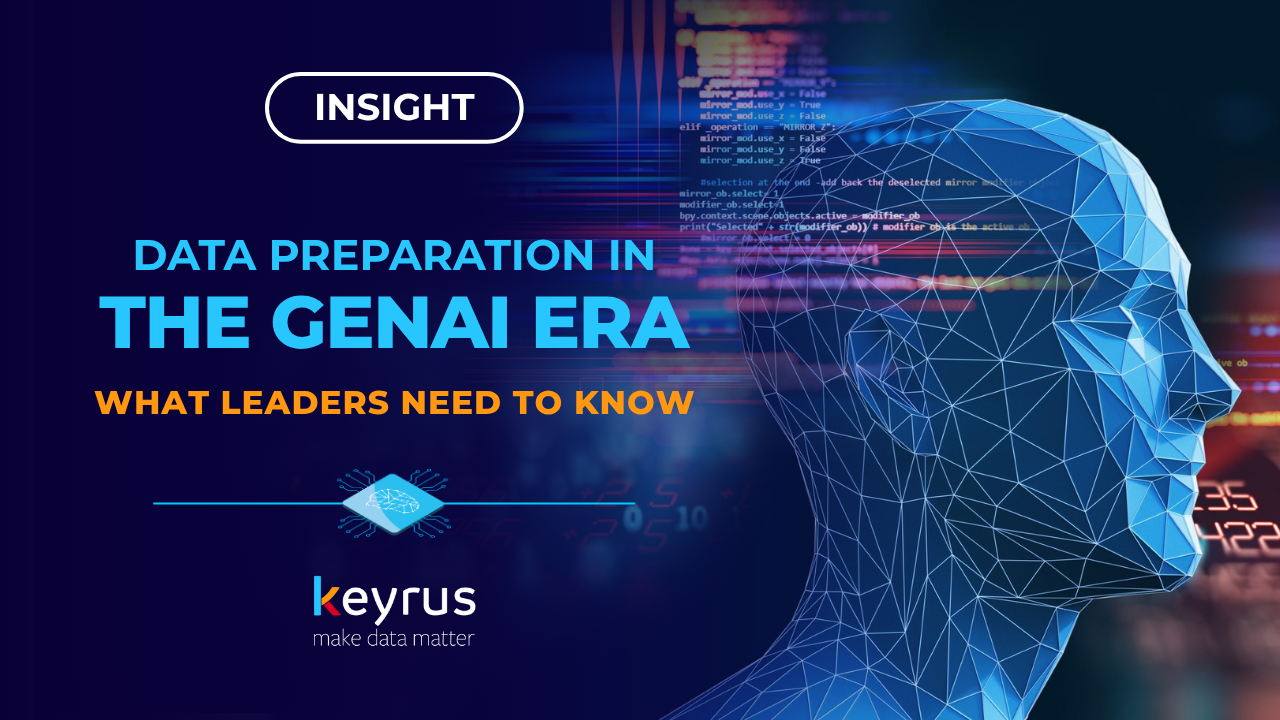The generative AI revolution is reshaping how organisations approach data strategy, but success hinges on one critical foundation: data preparation. As CDAOs, CIOs, and Heads of Data navigate this transformative landscape, the quality and readiness of your data have never been more crucial to business outcomes.
Research shows the adoption of GenAI doubled to 65% in just one year (2023-2024), with companies that moved early seeing clear returns—each dollar invested in GenAI delivering $3.70 back. Yet, despite an average spend of $1.9 million on GenAI initiatives in 2024, less than 30% of AI leaders report that their CEOs are satisfied with the ROI in AI, according to a recent report by Gartner. The difference between success and disappointment? Data readiness.
The Hidden Cost of Poor Data Preparation
The stakes couldn't be higher. Poor data quality costs companies an average of $12.9 million every year, and in the GenAI era, these costs multiply exponentially. Nearly 96% of organisations have faced data quality issues, with Gartner estimating that poor data quality is a key reason 30% of internal AI projects are abandoned.
Unlike traditional analytics, generative AI models amplify data inconsistencies, creating cascading effects that can undermine entire initiatives. A single poorly formatted field or incomplete dataset can render sophisticated GenAI models unreliable, eroding stakeholder confidence and delaying critical business outcomes.
Why GenAI Demands a New Data Preparation Paradigm
Volume and Velocity Challenges
GenAI applications consume data at unprecedented scales. Traditional data preparation workflows, designed for batch processing and structured analysis, struggle with the continuous, multi-modal data feeds that modern AI systems require. Leaders must architect systems capable of real-time data validation, transformation, and quality assurance.
Multimodal Integration Complexity
Emerging challenges at the intricate interplay between data integrity, multimodal integration, model accuracy, and governance frameworks are reshaping how we think about data preparation. GenAI models process text, images, audio, and structured data simultaneously, demanding sophisticated integration strategies that maintain consistency across diverse data types.
The Labelling and Context Crisis
The biggest data quality issue currently challenging in-house AI projects is the lack of proper labelling of ML training data. In the GenAI context, this extends beyond simple classification to include contextual metadata, lineage tracking, and semantic understanding that enables models to generate relevant, accurate outputs.
Strategic Imperatives for Data Leaders
Governance Framework Evolution
The traditional approach of centralised data governance struggles with GenAI's dynamic requirements. Forward-thinking organisations are implementing federated governance models that balance central oversight with domain-specific agility. This includes establishing data contracts, automated quality monitoring, and real-time compliance checking.
Investment in Data Infrastructure
Data shows AI adoption has significantly accelerated across organisations worldwide. A report by McKinsey says 78% of respondents confirmed their organisation uses AI in at least one business function, which is up from 72% in early 2024 and 55% a year earlier. This rapid adoption demands infrastructure that can scale with AI ambitions. Leaders must prioritise investments in data lakes, streaming architectures, and automated preparation pipelines that support both current needs and future growth.
Building Cross-Functional Capabilities
Success requires breaking down silos between data engineering, data science, and business teams. Over half of data and AI leaders report exponential AI-driven gains when they treat data preparation as a shared, cross-functional responsibility.
Emerging Best Practices for GenAI Data Readiness
Automated Quality Assurance
Leading organisations are deploying ML-powered data quality tools that identify anomalies, validate consistency, and flag potential issues before they impact GenAI models. These systems learn from historical patterns and adapt to evolving data characteristics.
Synthetic Data Integration
Further research shows that by 2025, more than 60% of enterprises will utilise synthetic data for AI and analytics. Smart leaders are incorporating synthetic data strategies to supplement real-world datasets, address privacy concerns, and create training scenarios that would be impossible to capture naturally.
Real-Time Data Preparation
The shift from batch to streaming data preparation enables GenAI applications to respond to changing conditions dynamically. This requires rethinking traditional ETL processes and embracing event-driven architectures that maintain data freshness without compromising quality.
The ROI Reality Check
Almost all organisations report measurable ROI with GenAI in their most advanced initiatives, and 20% report ROI in excess of 30%. However, the vast majority (74%) say their most advanced initiative is meeting or exceeding ROI expectations only when built on solid data foundations. The organisations achieving these results share common characteristics: they've invested early in data preparation capabilities, established clear governance frameworks, and created cultures where data quality is everyone's responsibility.
How Keyrus Accelerates Your GenAI Data Journey
At Keyrus, we understand that successful GenAI implementation starts with bulletproof data preparation. Our comprehensive approach combines deep technical expertise with strategic business acumen to transform your data landscape.
Our GenAI Data Readiness Framework includes:
Rapid Assessment & Strategy: We evaluate your current data estate and design a roadmap that aligns with your GenAI ambitions
Advanced Data Engineering: Our specialists implement scalable, automated data preparation pipelines that maintain quality at GenAI scale
Governance & Compliance: We establish federated governance frameworks that balance innovation with regulatory requirements
Change Management: Our consultants ensure your teams have the skills and processes needed to sustain GenAI success
Why Keyrus?
With over two decades of data transformation experience and deep expertise in emerging AI technologies, Keyrus has helped organisations across the UK and beyond turn data challenges into competitive advantages. Our proven accelerators, including K.Market for data marketplace creation and K.Convert for legacy system modernisation, demonstrate our commitment to practical, results-driven solutions.
We don't just implement technology—we partner with you to build data capabilities that scale with your business. From initial strategy through full GenAI deployment, Keyrus ensures your data foundation supports not just today's initiatives, but tomorrow's innovations.
Your GenAI success depends on your data foundation. Let's discuss how Keyrus can help you build the infrastructure that powers transformative AI outcomes.
